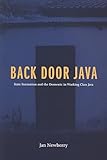Back Door Java : State Formation and the Domestic in Working Class Java / Janice Newberry.
Material type: TextSeries: Teaching Culture: UTP Ethnographies for the ClassroomPublisher: Toronto : University of Toronto Press, [2006]Copyright date: ©2006Description: 1 online resource (208 p.)Content type:
TextSeries: Teaching Culture: UTP Ethnographies for the ClassroomPublisher: Toronto : University of Toronto Press, [2006]Copyright date: ©2006Description: 1 online resource (208 p.)Content type: - 9781551116891
- 9781442603141
- Community life -- Indonesia -- Java
- Family policy -- Social aspects -- Indonesia
- Housewives -- Indonesia -- Java
- Javanese (Indonesian people) -- Social life and customs
- Urban women -- Indonesia -- Java -- Social conditions
- Women -- Government policy -- Indonesia
- Women, Javanese -- Social conditions
- Coursebook
- SOCIAL SCIENCE / Anthropology / Cultural & Social
- 307.76086230
- HQ1754.J39N49 2006
- online - DeGruyter
| Item type | Current library | Call number | URL | Status | Notes | Barcode | |
|---|---|---|---|---|---|---|---|
 eBook
eBook
|
Biblioteca "Angelicum" Pont. Univ. S.Tommaso d'Aquino Nuvola online | online - DeGruyter (Browse shelf(Opens below)) | Online access | Not for loan (Accesso limitato) | Accesso per gli utenti autorizzati / Access for authorized users | (dgr)9781442603141 |
restricted access online access with authorization star
http://purl.org/coar/access_right/c_16ec
In the densely populated urban neighbourhoods of Java, women manage their houses and their communities through daily exchanges of food, childcare, and labour. Their domestic work is based on local ideas of community cooperation and support, but also on the Indonesian government's use of women as unpaid social workers. Consequently, women are a pivotal point in both state-sponsored programs of domesticity and in the local practice of community exchange managed from individual houses. Back Door Java explores the everyday lives of ordinary urban Javanese from a new perspective on domestic space and the state. Using rich ethnographic description of a neighbourhood in Central Java, Newberry illuminates the ways in which state rule is intimately connected to the household and the community.
Mode of access: Internet via World Wide Web.
In English.
Description based on online resource; title from PDF title page (publisher's Web site, viewed 01. Nov 2023)


